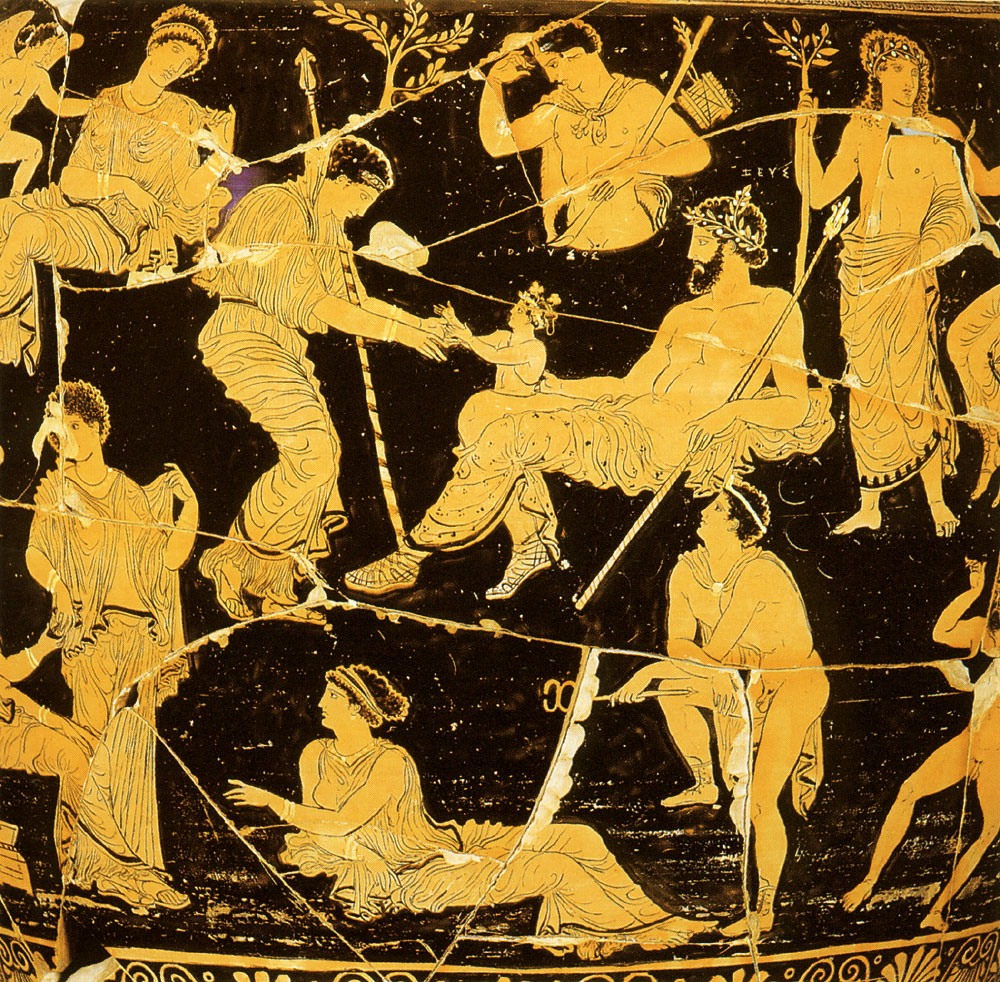Parties with drinking, dancing, and singing are rarely thought of as cults. Cults are often thought of as small religious groups that are frowned upon and viewed with suspicion by outsiders. Today, when we hear the word cult, we imagine people wearing white robes, creepy leaders and brainwashed followers who follow their leaders into rituals of mass suicide by Kool-Aid. In ancient Greece, however, everyone wanted to be a part of the Cult of Dionysus, where everyone would gather with free food, free wine, and the Goat Song.
Dionysus is the Greek God of wine, of winemaking, and of merriment and gaiety. He was supposed to have been born by the union of a mortal woman, Semele, princess of Thebes, and the greatest of the Greek gods, Zeus. Ancient Greek mythology holds that he was twice born, because when Semele was pregnant with Dionysus, Zeus took him and kept him in his thigh until he was ready to be born. While this may sound strange, there is a good explanation. Hera, Zeus’ wife who was also a goddess, had learned that Zeus had impregnated a moral woman; she was filled with jealousy and rage. The vengeful Hera disguised herself as a mortal woman and visited Semele. Once with her, she convinced Semele to ask Zeus to grant her one wish. When Semele asked for her one wish, Zeus promised to grant her anything. Semele asked Zeus to present himself in his true form, as a god not as a man, as suggested by Hera. Zeus kept his promise, but he knew that if Semele ever gazed upon him, she would die. So when he revealed himself to Semele in his true form, Zeus had Hermes take Dionysus from her womb and placed him into Zeus’ thigh so that he would not also die with Semele.1

As the god of wine, Dionysus is supposed to spread the knowledge of how to grow grape vines. In ancient Greece, wine was one of the few goods they could produce. Because of this, Dionysus was a major deity, and it was said that he was one of the twelve gods that lived upon Mount Olympus. Temples were erected in his honor and worship of him spread throughout the Greek poleis. Annual festivals called Dionysia were held in his honor and, of course, the purpose was to relax, feast, dance, and drink wine.2

Some dances in honor of Dionysus were performed on oiled wineskins, which were bags made out of animal skins that were filled with wine. Dionysus loved goats, donkeys, and tigers. Not only were those animals at the Dionysia, but their skins were also danced upon. When someone fell off the oiled wineskins, everyone cheered, laughed, and drank wine.
The Greeks held competitions to see who might be the manliest man and who could drink a pitcher of wine the fastest. The winner would receive a smaller oiled wineskin as a trophy, which was essentially another container of wine.3

At the annual Dionysia, the Goat Song was also preformed. The Goat Song gave birth to Greek drama. Originally, a song or hymn was sung as a goat was being sacrificed to Dionysus. The song often addressed questions that were arising about divine law, judgement, and various social conflicts of general concern. The Goat Song was seen as something of a group discussion or address of common concerns, and as a way for people collectively and individually to purify their minds. The hymn then became a performance piece, sung by a chorus. The performance evolved over time to include first a monologue, and then with the addition of a second voice, a dialogue. Eventually, more voices were added, and the performance of the Goat Song became the tragic drama we have come to associate with the great Greek tragedians Aeschylus, Sophocles, and Euripides. In fact, the Greek word tragedia, from which we get our word tragedy, literally translates as “the song of a male goat.” The Greeks truly loved drama because they felt that the gods were speaking to them and judging their piety, rather than merely being annoyed by them.4
The cult of Dionysus does not seem so suspicious now. There were not any outrageous daily rituals or strange articles of clothing they had to wear. The cult of Dionysus consisted of dancing, drinking, singing, and feasting, every college student’s four favorite things.
- Salem Press Encyclopedia, January 2016, s.v. “Dionysus,” by Rebecca K. Rector. ↵
- Eleni Pachoumi, “Dionysus in the Greek Magical Papyri,” Symboae Osloenses 88, no. 1, (2014): 129. ↵
- Alana Koontz, “The Art and Artifacts Associated with the Cult of Dionysus,” (Masters Thesis, University of Wisconsin-Milwaukee, 2013), 4. ↵
- Britt-Mari Näsström, “The rites in the mysteries of Dionysus: the birth of the drama,” Åbo Akademi: Open Journal Systems. (2014): BASE, EBSCOhost. ↵



77 comments
Yazmin Garza
I never personally considered Dionysus a major god, even though I knew that he was one of the 12 gods that lived on Olympus, but know that I have learned of the ancient Greeks’ love of wine and partying, I have changed my opinion on the god of wine. I never knew that plays, tragedies, in particular, came from a song dedicated to Dionysus. I think the evolution from the Goat Song all the way to modern plays is an interesting path and I’m glad I got to learn about it from this article.
Diego Terrazas
This “cult” sounds more like a fraternity, but I guess Dionysus being the god of wine normalized such activities in this cult, thus deeming them appropriate. It must have been a rather preferred cult. I also did not know Dionysus was held so highly as far as Greek mythology goes. This goes to show how much Greeks loved their wine consumption and social gatherings.
Dalton Moy
This was an interesting article to read. I had known the large parties were had to celebrate Dionysus, however I had not realized that they were so crazy. I had always pictured the celebrations as a civil, calm gathering of a group of people who were honoring a god while drinking wine. After reading this, I am now picturing Dionysus being the cause of off the wall, Greek Fraternity parties.
Jose Fernandez
I really enjoyed reading this article. It is fun to compare how they used to drink back then and how people drink now. Maybe it hasn’t changed that much. This topic is very interesting; and the author does a great job presenting the most important details. I didn’t know much about Dionysus, and this article showed me a lot. Even though it is short, it is still very informative.
Belene Cuellar
It is interesting to see the Greek worship this God and how many parties are thrown in his honor. I didn’t even know that there was a god for wine. I was also surprised to find out that Zeus was his father and that his wife made sure to kill his lover. I am wondering if this god ever had a lover in his life or if he ever produced any children with mortal women.
Adrian
Yo! If you’re still curious, Dionysus did indeed have a bride, who was indeed mortal but later blessed as immortal (I believe). Her name is Ariadne, and she has a story of her own… basically she was lied to by the hero Theseus and abandoned to die alone on an island, but then Dionysus found her there and asked her why she wept. She told her story, then they fell in love and lived happily ever after. :’) hooray! (As you are likely aware, this was rather rare in ancient Greece.)
Emily Jensen
This article was a really fun read. I laughed reading about the competitions that the men had in order to determine the manliest man by whoever drank wine fastest, not much has changed between now and then. Like most commenters, I wasn’t familiar with the cult of Dionysus, but I really liked the way the author explained it. A very easy to understand article.
Luke Lopez
This was a very interesting article on the Greek god Dionysus. Dionysus was one of the twelve gods that lived in Mount Olympus, because he was the god of wine and he grew grape vines. I have never heard of the Goat song before, and I certainly did not know that this consisted of a goat being sacrificed to Dionysus while a hymn was sung. Overall, this was a great article that thoroughly explained Dionysus and his cult.
John Smith
The Cult of Dionysius sounds like a pretty fun time, I’m sure that their parties would have put any of ours to shame. The idea that a party could a form of worship is outlandish, but exciting none the less. It’s interesting to learn of Dionysius’s origins and to hear more Greek drama in the form of their ancient gods.
Valeria Perez
I enjoy hearing about the Greek gods’ origin stories and the characteristics that the Greeks gave them that make them seem so human. It very different nowadays to hear the story of how people were eager to join a cult. What did people have to do in order to become part of Dionysus cult? What happened to the cult? Really good article!
Nathan Alba
I thought the title really drew in the reader. However seeing as the cult was not like the usual “cult” assumed by today’s standards, it did kind of throw me off. I did like the Dionysus origin story. From being a child of an affair to being placed into Zeus’ thigh all sound like a rough beginning. But in the end he did turn out to be the ‘fun’ god. Most people today would probably want to be in the ‘Cult of Dionysus’ too.